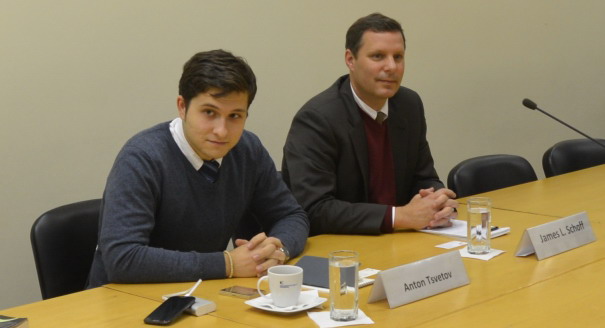Registration
You will receive an email confirming your registration.
What are the prospects for the future of U.S.–Japan relations? Speaking at the Carnegie Moscow Center, James L. Schoff, a senior associate in the Asia Program at the Carnegie Endowment for International Peace, gave an overview of the current state of bilateral relations and discussed how the United States assesses Japan’s foreign policy under Prime Minister Abe.
Carnegie’s Dmitri Trenin gave the opening remarks and the Russian International Affairs Council’s Anton Tsvetov moderated.
Discussion Highlights
- U.S.–Japan Relations: Schoff characterized bilateral relations between the United States and Japan as a very firm friendship, which he argued will become stronger in the new regional context. According to Schoff, the main task of Washington in the Asia-Pacific region now is collaboration with Japan, which does not threaten the security of other players in this region and which is mutually beneficial.
- Other Relations in the Region: Another main task for the United States, Schoff said, is to develop trilateral (the United States—China—Australia) and multilateral relations in the region. He suggested that the best way to do this is through such substructures as ASEAN, the East Asia Summit, and the Trans-Pacific Partnership (provided, he added, that the partnership passes the U.S. Congress). Also, the United States should promote harmonization of relations among individual Asia-Pacific countries, such as Japan and South Korea, Schoff concluded.
James L. Schoff
James L. Schoff is a senior associate in the Carnegie Asia Program. His research focuses on U.S.-Japanese relations and regional engagement, Japanese politics and security, and the private sector’s role in Japanese policymaking.
Dmitri Trenin
Dmitri Trenin, director of the Carnegie Moscow Center, also chairs the research council and the Foreign and Security Policy Program.
Anton Tsvetov
Anton Tsvetov is the media and government relations manager at the Russian International Affairs Council. His research interest focuses on the Asia-Pacific and especially Vietnam.
